


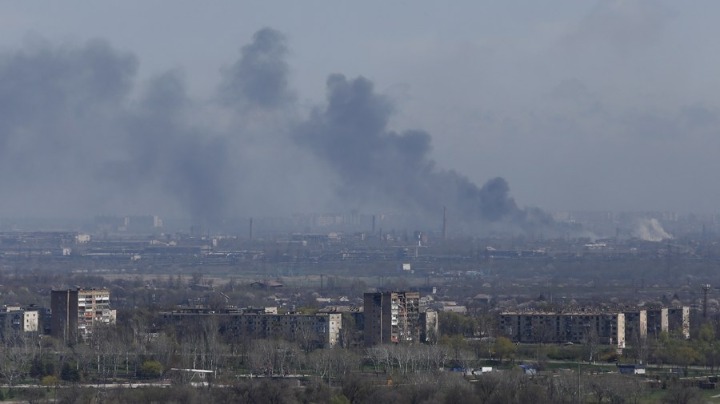
Russia's President Vladimir Putin says his country will continue its yearlong "special military operation" in Ukraine, and he accused the US-led NATO alliance of fanning the flames.
Russia-Ukraine conflict would have cost world economy $1.6 trillion in 2022, according to a study published by the German Economic Institute.

ANKARA -- Turkey had hoped for a tourism revival in 2022 as the COVID-19 pandemic ebbs. However, the Russia-Ukraine conflict will have a notable toll on the sector, making the revival with even less hope than before.
"Last year, around 28 percent of foreign visitors to Turkey came from Russia and Ukraine. The ongoing conflict will have a real impact on our tourism industry this year," said Firuz Baglikaya, head of the Association of Turkish Travel Agencies (TURSAB).
Turkey welcomed 4.7 million Russian and 2 million Ukrainian holidaymakers in 2021, Baglikaya said, adding that the number of tourists would be considerably lower as there were significant reservation cancellations from both countries.
"Even if the conflict ends, our tourism will be affected," Baglikaya said.
He added that Turkey will try to compensate for the loss by attracting visitors from the Balkans and the Middle East.
"We don't expect any tourists from Ukraine this year and the number of Russians is projected to be around 1.5 million," Nusret Canatar, general manager of two five-star hotels located in Side and Alanya, told Xinhua.
"We expect a very serious loss of revenues, some 30 percent of all tourism receipts for 2022," Canatar warned.
For Turkey's southern resorts, the high season for Russian tourists normally starts in early May.
But even if the conflict ends soon, western sanctions imposed on Russia would have decimated the purchasing power of most Russian households, who may later cancel their overseas holidays, Canatar said.

After airlines such as Airbus and Boeing joined Western financial sanctions against Russia, whose major banks were also excluded from the SWIFT system, the status and frequency of flights from Russia to Turkey should also be concerned, he said.
The tourism industry is a key pillar of Turkey's economy, as it constitutes 10 percent of the country's gross domestic product (GDP).
Contrary to the sharp decline in Russian and Ukrainian tourists, Israeli travelers might return to Turkish resorts due to the recent thaw in ties between Turkey and Israel.
"Twenty years ago, tens of thousands of Israeli tourists used to travel to Turkey for holidays. Now, as the two countries are mending ties, we expect tourists' return to our Mediterranean and Aegean coasts," Esra Kilic, an official from an Ankara-based tour agency, told Xinhua.
On March 9, Israeli President Isaac Herzog flew for a meeting with Turkish President Recep Tayyip Erdogan in the capital Ankara, the first high-level meeting between the two countries in years.
Kremlin urges cooperation after Kyiv's rejection of Moscow's Mariupol demand
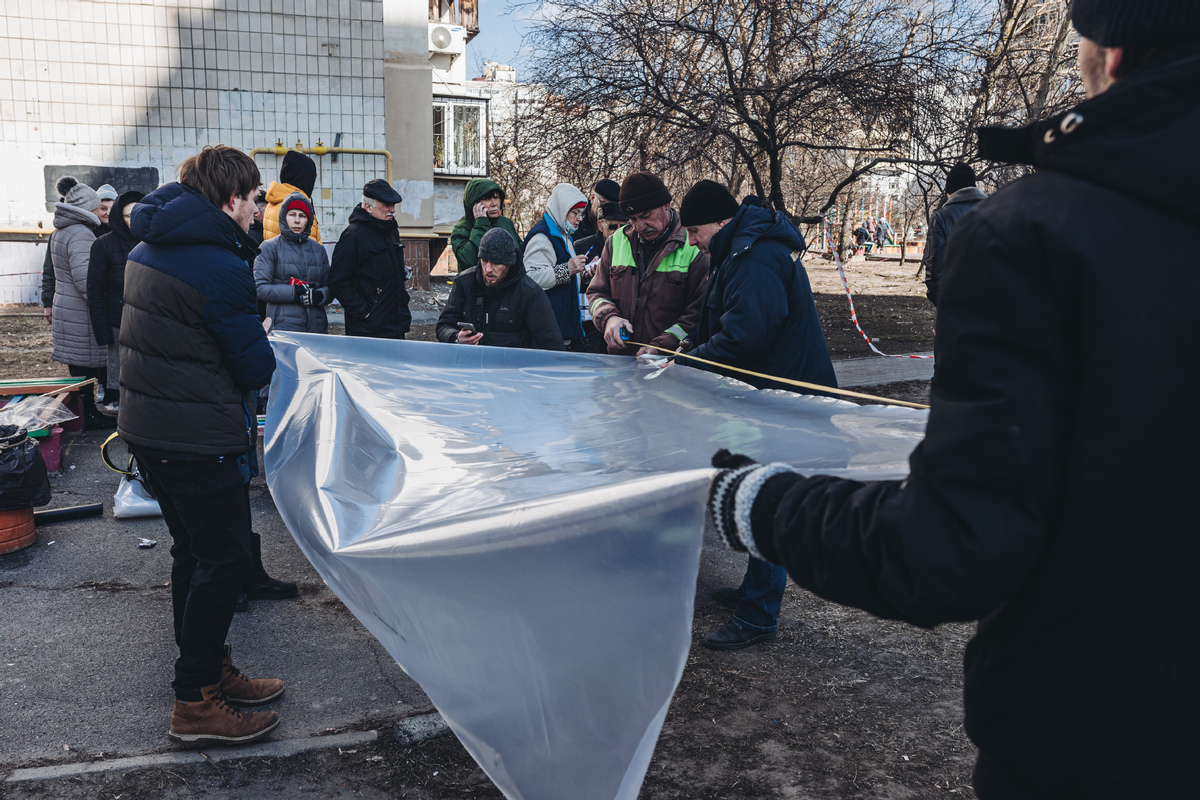
The Kremlin has highlighted the importance of more cooperation from Kyiv in negotiations after the Ukrainian government rejected an ultimatum to give up the besieged city of Mariupol.
Speaking to reporters on a conference call on Monday, Kremlin spokesman Dmitry Peskov said Moscow is grateful to all countries that offer mediation in negotiations with Kyiv, but it is important not just to opt for a venue for a meeting but also to make Ukraine more cooperative.
Significant progress in the talks is yet to be made.
Delegations from Russia and Ukraine were due to resume negotiations online on Monday morning.
Earlier on Monday, Ukrainian Deputy Prime Minister Iryna Vereshchuk was reported in local media as stating the government's rejection of the Russian demand for the coastal city.
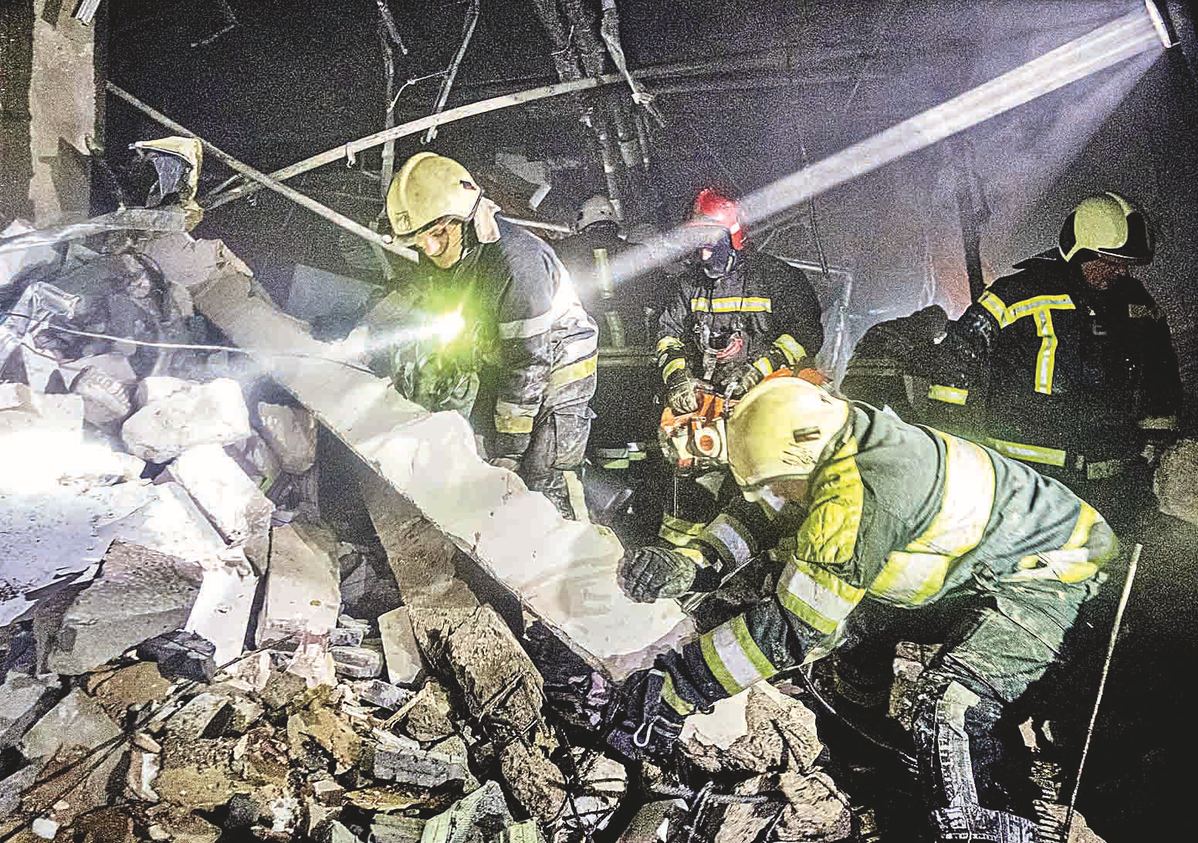
Russia's Defense Ministry said Ukraine had until 5 am on Monday to respond to the Russian proposals, warning that more than a court-martial awaits those who do not surrender.
The southern port city of Mariupol is a pivotal target in Russia's special military operation in Ukraine.
"We can't talk about surrendering weapons," Vereshchuk said hours before the Russian deadline passed.
"We have already informed the Russian side about it," she said, demanding that Moscow instead open humanitarian corridors to allow an estimated 350,000 people still trapped in the city to leave.
Regardless of the entrenched differences between the two sides, David Arakhamia, the leader of the parliamentary group of the ruling Servant of the People party, said the talks are continuing every day, according to a report by news outlet Ukrainiskaya Pravda.
Picking up on Vereshchuk's demand for humanitarian corridors from Mariupol, Mikhail Mizintsev, chief of Russia's National Defense Management Center, said that Russia would open eastward routes from 10 am to 12 am on Monday.
According to Mizintsev, each convoy would be escorted by mine-clearing personnel in order to ensure a safe evacuation of civilians.
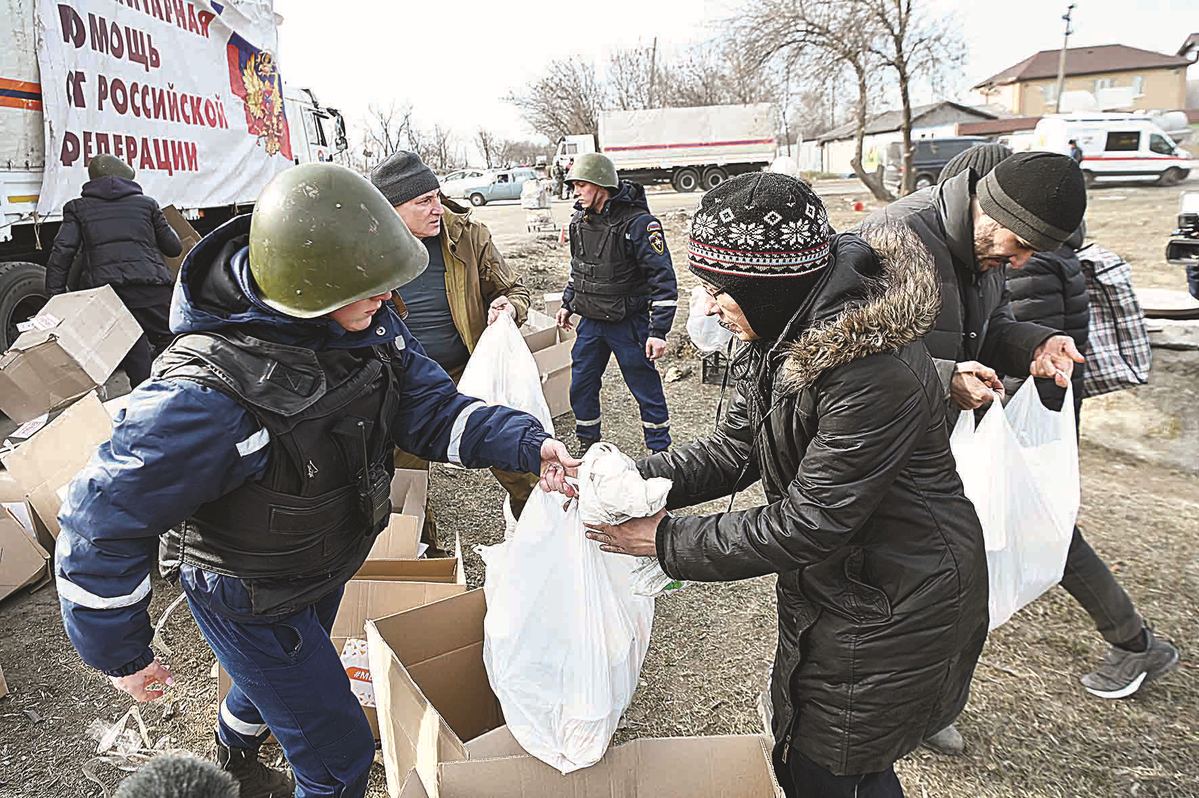
Russia announced eight humanitarian corridors for Sunday, with Ukraine announcing seven additional routes, Mizintsev said.
Meanwhile, Russian forces have continued their campaign for the capital. Ukraine's State Emergency Service said late on Sunday that a shopping center and cars in an adjacent parking lot caught fire following Russian bombardment in Kyiv's Podilskyi district.
Kyiv Mayor Vitali Klitschko announced a new curfew for the Ukrainian capital later on Monday that would last until Wednesday morning, according to Agence France-Presse.
Russian Defense Ministry spokesman Igor Konashenkov said the forces were completing the defeat of the Donbass nationalist battalion and have advanced 12 more kilometers.
United States President Joe Biden will travel to Warsaw on Friday, after meetings in Brussels, Belgium, with NATO allies and G7 and European Union leaders, according to a statement from White House press secretary Jen Psaki.
Agencies contributed to this story.

KYIV - Ukrainian President Volodymyr Zelensky said that Kyiv's compromises at peace talks with Russia would be put to a nationwide referendum in Ukraine, the government-run Ukrinform news agency reported Monday.
"I explained to all negotiating groups: when you talk about all these changes, and they can be historic, there is nowhere to go - we will have a referendum," Zelensky was quoted as saying in an interview with the Ukrainian public broadcaster Suspilne.
Zelensky emphasized that he stands ready for any compromises if they are supported by the Ukrainian people.
On March 18, Ukrainian Presidential Advisor Mykhailo Podolyak said a ceasefire, the withdrawal of troops and strict security guarantees with specific formulas are Ukraine's main demands at peace talks with Russia.
The fourth round of negotiations between Ukrainian and Russian delegations started on March 14 via video link.

For Kenyans like Mbithe Kyule struggling to make ends meet due to the country's high inflation, a conflict on another continent is about to make daily life a lot more difficult.
Kyule, who lives in the capital, Nairobi, usually gets by selling popsicles and living as frugally as she can. However, there has been a recent surge in the price of basic commodities such as sugar, cooking oil, rice and corn flour.
In a matter of months the price of a liter of cooking oil has risen sharply from $1.30 to $3.10, while the cost of a carton of milk has increased from 40 cents to 50 cents.
"I usually earn $2 to $5 per day and only concentrate on putting food on the table now. I no longer save," Kyule said.
As in many other parts of the world, the inflation rate in Kenya is high, with people also suffering from the impact of the COVID-19 and millions of job losses as well as the lingering effects of a drought.
Supplies disrupted
Food prices in Kenya and the whole of Africa are expected to continue rising over the next few months, due to disruptions to food supplies caused by the Russia-Ukraine conflict, international organizations and experts have warned. Many African countries rely heavily on imports of grains such as wheat and corn.
Kenya's consumer price index stood at 5.08 percent in February, mainly driven by increases in commodity prices, according to the Kenya National Bureau of Statistics.
The price of food and non-alcoholic beverages increased by 8.7 percent year-on-year, while furnishings, household equipment and routine household maintenance costs rose 5.41 percent, the bureau said.
Using the hashtag #lowerfoodprices, Kenyans have taken to social media to protest the high cost of living. "I am concerned that 1,000 shillings ($8.75) can't buy basic things for my family to last two days," one user called Prudent Lilly wrote.
In neighboring Uganda, members of Parliament are urging the government to take action over high commodity prices.
At a March 2 parliamentary sitting, MPs highlighted how the high prices had impacted the citizens, saying the cost of fertilizer, for instance, had increased more than fivefold.
The United Nation's Food and Agriculture Organization's food price index, which tracks the international prices of items, said global food prices rose to a record high in February, led by vegetable oils and dairy products.
Upali Galketi Aratchilage, an economist at the FAO, said food price inflation is coming from outside food production, particularly in the energy, fertilizer and feed sectors. "All these factors tend to squeeze profit margins of food producers, discouraging them from investing and expanding production," Aratchilage said in a statement on March 4.
The World Bank has warned that the Russia-Ukraine conflict is likely to increase the price of food in emerging markets and developing economies.
Global commodity markets are facing a reduction in grain supplies, higher energy prices, higher fertilizer prices, and trade disruption due to closures of major ports.
Gilbert F. Houngbo, president of the International Fund for Agricultural Development, said continuation of the conflict between Russia and Ukraine will be catastrophic for the world, particularly for people already struggling to feed their families in African countries.
'Grappling with hunger'
"Forty percent of wheat and corn exports from Ukraine go to the Middle East and Africa, which are already grappling with hunger issues, and where further food shortages or price increases could stoke social unrest," Houngbo said in a statement.
Paloma Fernandes, Kenya's Cereal Millers Association chief executive, warned the Russia-Ukraine conflict will affect the cost of production in East Africa and further increase the cost of living in the region.
"Our region relies on both Ukraine and Russia as key exporters for grain, as they account for 33 percent of global wheat supplies," Fernandes said at a news conference.
United Nations Secretary-General Antonio Guterres called for immediate peace negotiations to end the conflict at a news conference in New York on March 14.
He said 45 African and less developed countries import at least one-third of their wheat from Ukraine and Russia, and the conflict is worsening food shortages in poorer countries.
"Many African countries and poor countries are dependent on wheat production in Russia and Ukraine, but now they are at risk because of the war," Guterres said.
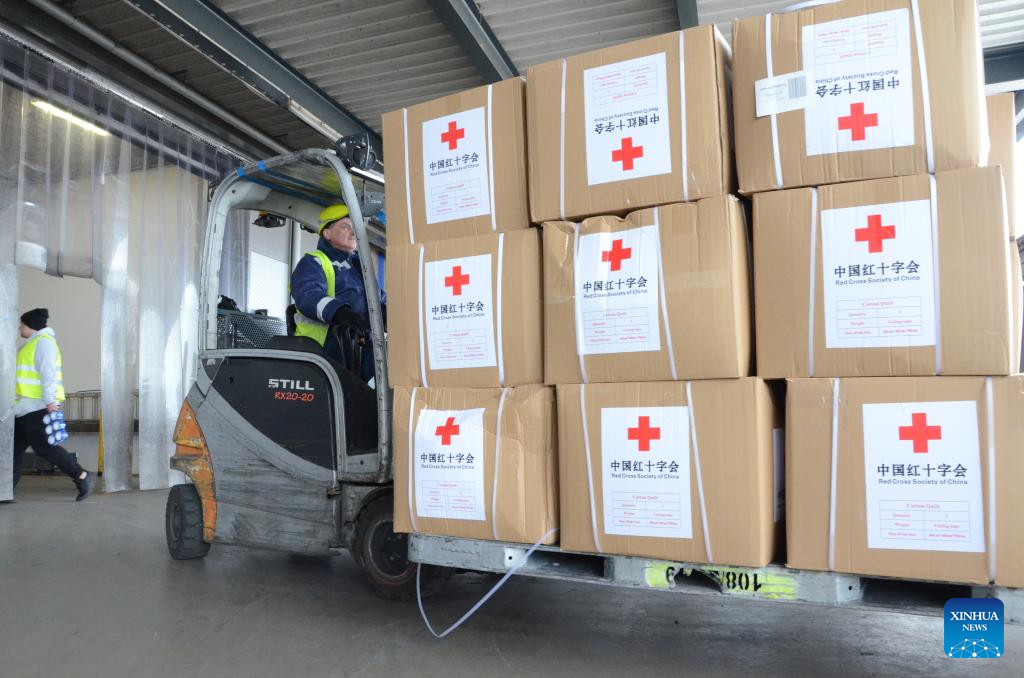
The Chinese government will provide another 10 million yuan ($1.57 million) worth of humanitarian assistance to Ukraine, said Foreign Ministry spokesman Wang Wenbin on Monday, after the Red Cross Society of China provided 5 million yuan worth of assistance to the Ukrainian Red Cross Society earlier this month.
"China is extremely concerned about civilians harmed in the conflict between Ukraine and Russia," Wang told a daily news conference. "The most urgent imperative for the international community is to tackle the potential large-scale humanitarian crisis that might arise in the conflict."
China will continue to play a constructive role in promoting the easing of tensions and make efforts to overcome the humanitarian crisis, Wang said.
The Red Cross Society of China said it provided three batches of emergency humanitarian assistance to Ukraine from March 9 to 14.These included food, sleeping bags, infant powdered formula, cotton quilts, and waterproof mats.
China has put forward a six-point proposal to ease the humanitarian situation in Ukraine, including that humanitarian action must be neutral and avoid politicization of humanitarian issues, and that effective measures should be taken to protect civilians and prevent secondary humanitarian disasters in Ukraine.

The European Union's sustainable food strategy is to be reviewed because of widespread opposition across Europe's food and agriculture sector, and also the ongoing economic impact of the Ukraine conflict, with French President Emmanuel Macron saying it was based on a pre-Ukraine crisis world.
In addition to the widely-publicized dependence of much of Europe on Russian energy supplies, the conflict in Ukraine has also sent the cost of fertilizer and crops, such as maize, soaring-at the moment, half of the maize used in the EU comes from Ukraine.
The Farming Life website calls Ukraine the breadbasket of Europe, and says it is the world's largest producer of sunflower oil, and fourth-largest producer of potatoes, exporting crops not just to the EU but also to China, Turkey, India, and Africa.
In light of the disruption these supply lines will face, Europe needs to review its approach to agriculture, with widespread complaints about the proposed new policy coming from Spain and Italy, and France, where Macron is running for re-election.

Two years ago, it was agreed that there should be a new bloc-wide approach to farming, to get carbon emissions down to net-zero by the year 2050, but the urgency of the new situation means this may have to change, with EU agriculture ministers meeting on Monday to discuss this.
"There is a desire to make sure that the objectives we have in our public policy are consistent with the need for food security... and sovereignty," an EU diplomat told the Financial Times.
The EU food strategy, known as Farm to Fork, is part of the European Green Deal and was billed as "aiming to make food systems fair, healthy and environmentally-friendly".
"Food systems cannot be resilient to crises, such as the COVID-19 pandemic, if they are not sustainable," the official description of the policy said.
"We need to redesign our food systems which today account for nearly one-third of global (greenhouse gas) emissions, consume large amounts of natural resources, result in biodiversity loss and negative health impacts (due to both under-and over-nutrition), and do not allow fair economic returns and livelihoods for all actors, in particular for primary producers."
One of the most controversial innovations suggested by Pekka Pesonen, secretary-general of the EU farmers' lobby group Copa-Cogeca, is to boost productivity in an emissions-friendly way by allowing gene editing of plants and animals.
"Roughly speaking, two-thirds of the productivity improvements will come from better genetic material, our crops and livestock," he said.
European agriculture commissioner Janusz Wojciechowski is on record as saying Farm to Fork is the best long-term solution to Europe's agricultural challenges, but because of the recent disruption, he has proposed some temporary alterations to its terms.
However, pressure groups are calling on him to resist being steered too far away from its values.
"Watering down the Farm to Fork strategy and its policies will maintain Europe's dependence on non-renewable energy sources like fossil fuels, and will go against what is needed right now to secure food for all," said a letter from the Food Policy Coalition.

Standing behind the peace talks, controlling the humanitarian crisis and avoiding a greater impact on the global economy, a number of developing countries have echoed China's stance on these topics of common concern as they discussed the Ukraine crisis in diplomatic circles.
As led by President Xi Jinping, China, alongside a number of nations from Asia, Africa and South America, want to make sure that "give peace a chance" does not end up as an empty slogan, officials and experts said.
Since the outbreak of the crisis, Xi has talked to the leaders of a number of countries separately by telephone or video link and discussed the Ukraine situation.
"The comments and all the diplomacy efforts made by Xi fully display the broad vision and strong sense of duty that a major country should have, and this is exactly what a major country is expected to be doing," said Su Xiaohui, deputy director of the China Institute of International Studies' Department of American Studies.
Su highlighted a telephone conversation Xi had with South African President Cyril Ramaphosa on Friday.
During their talk, both leaders voiced support for Russia and Ukraine keeping up the momentum of their peace talks, and they agreed that sovereign countries are entitled to independently decide on their own positions.
"In contrast to the bloc confrontation and unilateral sanctions sought by US-led Western countries in the Ukraine crisis, China and many other developing countries hold their own views and positions, comprising a vast 'middle zone'," Su said.
As many "middle zone" countries call for the success of a cease-fire via peace talks and offer humanitarian aid instead of weapons, they stand in sharp contrast to some Western countries' forcing of other nations to take sides, and "the global community is crystal clear about which pattern will be helpful to eventually resolving the crisis", Su said.
On March 2, 35 countries-including Algeria, China, South Africa and Mongolia-abstained from voting on a UN General Assembly resolution on Ukraine.
Algerian Foreign Minister Ramtane Lamamra told State Councilor and Foreign Minister Wang Yi in a meeting on Sunday that their two countries' abstention sent a clear signal that they hope to maintain independence and are willing to give peace a chance.
Algeria believes that China's proposition, based on international fairness and justice and aimed at promoting peace, stability and security, represents a correct and broad path, he said.
Wang told reporters after the meeting that the majority of countries in the world, including China and other developing countries, "share reasonable concerns and hold similar positions".
No country should be forced to choose sides, and when dealing with complex issues and divergent views, one should not opt for the simplistic approach of "friend or foe" and "black or white", Wang said.
Xu Yicong, a researcher at the China Foundation for International Studies and a former Chinese ambassador to Cuba, said, "As many countries have discussed the situation and made constructive proposals, their ideas deserve equal opportunity to be known by more people."
Independent roles
Indonesia holds the chairmanship of this year's G20 Leaders' Summit. In an interview with Japan's Nikkei newspaper this month, Indonesian President Joko Widodo called for a cease-fire in Ukraine and said continued dialogue rather than economic sanctions on Russia is the way to resolve the crisis.
"US-led Western countries should realize that many major emerging economies-such as Brazil, China, India, Indonesia and South Africa-are highly self-reliant in shaping their own strategy," said Zhu Jiejin, a professor of global governance studies at Fudan University's School of International Relations and Public Affairs.
"These countries do not easily take sides between the US and Russia in the crisis. They take the world's bigger picture into consideration and act on their own interests. They know even the so-called unprecedented sanctions will not lead to peace," Zhu added.
A number of Middle East countries have refused to take sides on the Ukraine situation as well, leading to complaints or concerns from some US officials and policy researchers.
The Washington Institute think tank said in a policy analysis this month that "many nations in the Middle East are keen on balancing their relationships with the United States and Russia".
Xue Qingguo, a professor of Arab studies at Beijing Foreign Studies University, noted that many Gulf nations view the crisis differently from the US and its allies.
"The majority of Middle East countries' governments and public subscribe to neutrality and not taking sides, and China's stance on the situation is winning more support there," Xue said.
Xue noted that in addition to the Middle East, most African, Southeast Asian and South American countries have not followed up on the sanctions pushed by US-led Western countries.
"The voice of the vast number of developing countries should be given a higher profile, which is also giving peace a chance. And the overwhelming global support to sanctioning Russia, as portrayed by the media outlets of the US and some of its allies, is actually something false and overblown," Xue said.
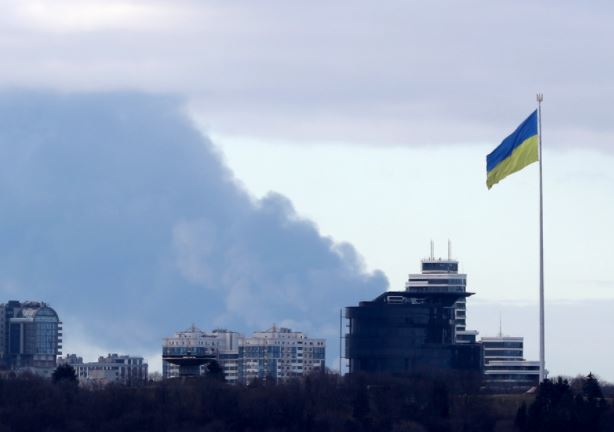
BEIJING - China has decided to provide more humanitarian aid supplies to Ukraine worth 10 million yuan ($1.57 million), a Chinese Foreign Ministry spokesperson said Monday.
Spokesperson Wang Wenbin said at a daily press briefing that this additional offer was based on the development of the situation and the actual needs of Ukraine. The Red Cross Society of China had earlier provided 5 million yuan worth of humanitarian aid supplies to the Ukrainian side.
"China pays close attention to the civilian casualties in the Russia-Ukraine conflict," Wang said, noting that the top priority for the international community now is to deal with the possible large-scale humanitarian crisis.
Wang said China has put forward a six-point initiative on alleviating the humanitarian situation in Ukraine and has taken concrete actions, including providing humanitarian aid supplies.
"China will continue to play a constructive role in easing the situation in Ukraine and stands ready to make its own efforts to overcome the humanitarian crisis," said Wang.
MOSCOW - A senior naval commander from Russia's Black Sea Fleet had been killed in Ukraine, said governor of Sevastopol, a port city on the Crimea Peninsula, on Sunday.
Post-Captain Andrei Paliy, the fleet's deputy commander, died during fighting in the eastern Ukrainian port city of Mariupol, Mikhail Razvozhayev said on the messaging app Telegram.
Sevastopol is the base of Russia's Black Sea Fleet.
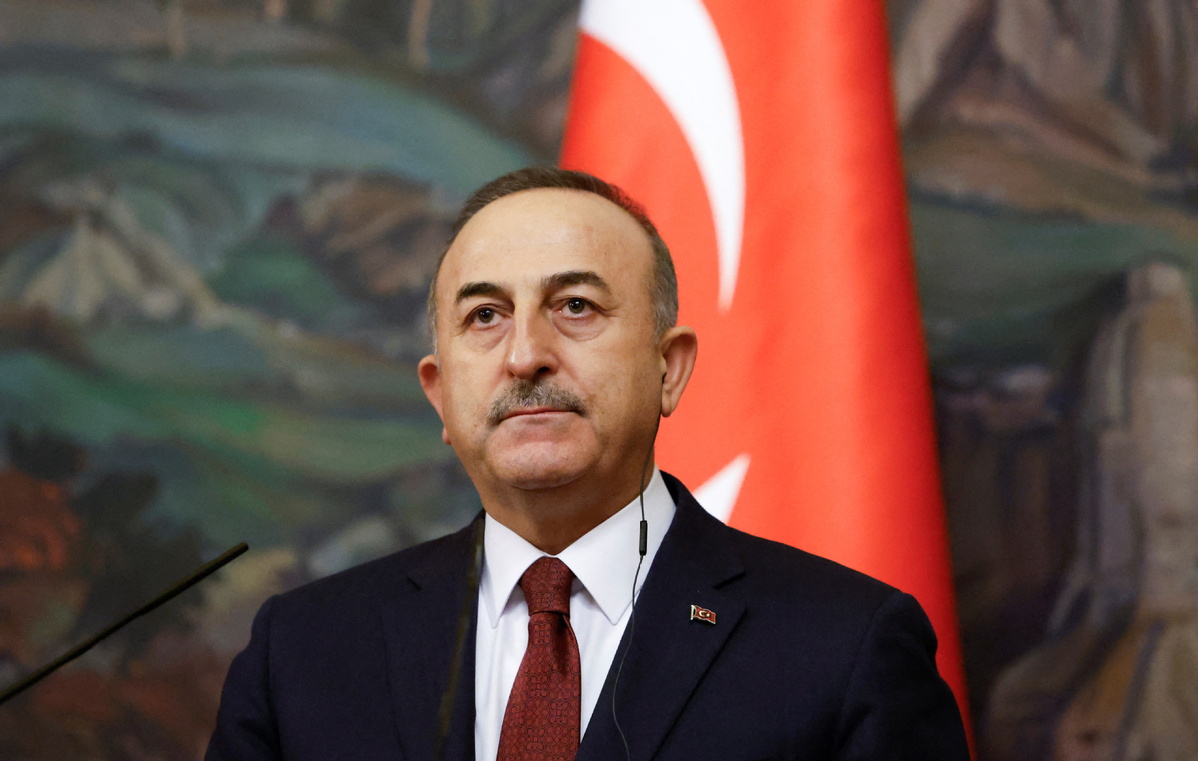
ANKARA - Russia and Ukraine have made progress on the "critical" articles of a ceasefire agreement being negotiated, but some issues still require decisions by their leaders, Turkish Foreign Minister Mevlut Cavusoglu said Sunday.
"If the parties do not step back from their current positions, we can say that we are hopeful for a ceasefire," Cavusoglu told local daily Hurriyet.
"We see that the parties are close to agreement on fundamental issues," Cavusoglu said, reiterating his optimism when attending a meeting of the ruling Justice and Development Party.
In the past week, Cavusoglu had meetings with his Russian and Ukrainian counterparts in Moscow and Lviv, respectively.
Speaking to Hurriyet on Saturday, Turkey's Presidential Spokesperson Ibrahim Kalin said that Moscow and Kyiv were negotiating on six points, namely "Ukraine's neutrality, disarmament and security guarantees, the 'de-Nazification,' removal of obstacles on the use of the Russian language in Ukraine, the status of Donbass and the status of Crimea."
On March 10, Turkey hosted the Russian and Ukrainian foreign ministers on the sidelines of a diplomacy forum for their first high-level negotiations since the onset of the conflict, although the talks did not yield much progress on a ceasefire.
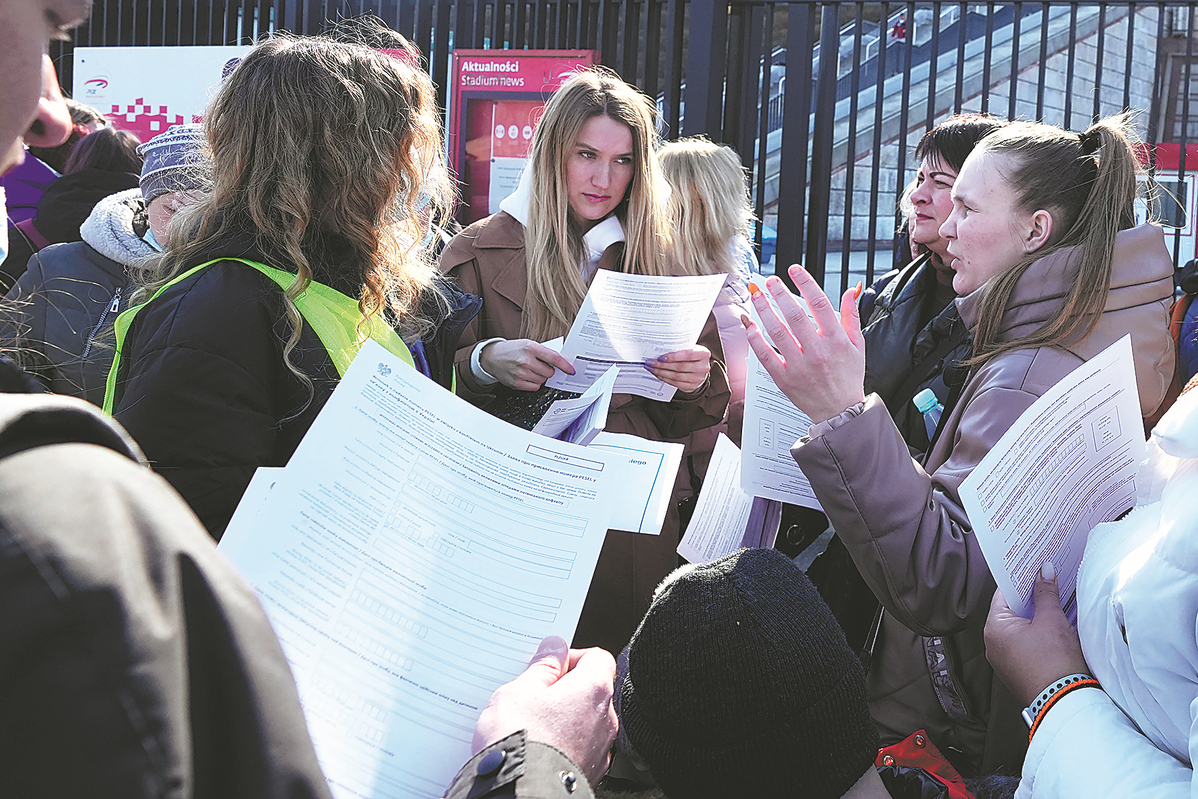
WARSAW-Hoping to restore some normalcy after fleeing the conflict in Ukraine, thousands of refugees waited in long lines on Saturday in the Polish capital Warsaw to get identification cards that will allow them to get on with their lives-at least for now.
Refugees started queuing at Warsaw's National Stadium overnight to get the coveted PESEL identity cards that will allow them to work, live, go to school and get medical care or social benefits for the next 18 months. Still, by midmorning, many were told to come back another day, as the demand was too high despite Polish authorities having simplified the process.
"We are looking for a job now," said Kateryna Lohvyn, 30, who was standing in line with her mother, adding that it took a bit of time to recover from the shock.
"We don't yet know (what to do).But we are thankful to the Poles. They fantastically welcome us."
Maryna Liashuk said the warm welcome from Poland has made her feel at home. If the situation worsens, Liashuk said, she would like to stay permanently in Poland with her family.
"If there is someplace to return to, we will do that. And if not, then we simply will remain here," Liashuk said.
Poland has taken in more than 2 million refugees from Ukraine-the bulk of more than 3.3 million people that the United Nations said have fled since Russia's conflict with Ukraine began on Feb 24. Hundreds of thousands more have also streamed into Hungary, Slovakia, Moldova and Romania.
Most refugees fleeing Ukraine have been women and children.
Polish authorities said more than 123,000 refugees have been given ID numbers, including more than 1,000 each day in Warsaw, since the program was launched on Wednesday.
Svetlana, a Ukrainian woman from Ivano-Frankivsk who has lived and worked in Poland for more than 10 years, has had relatives come now to Poland. She said receiving Polish ID cards will make a huge difference for the refugees.
"This is really so important to us that we can officially look for work, send children to school and be active here," Svetlana said. "It really changes the way we feel here."
Refugees can receive a one-time benefit of 300 zlotys ($70) per person and a monthly benefit of 500 zlotys for those under the age of 18.Those who find jobs will have to pay taxes.
Pavlo Masechko, a 17-year-old from Novovolynsk in western Ukraine, has been trying to rebuild his life in the southeastern Polish city of Rzeszow.
"It is so stressful to leave your country in a moment like this," said Masechko, who has joined a local school in Poland since arriving. Now, Masechko's Ukrainian teacher is trying to organize classes online.
"When the situation started, it was very difficult for me to focus on other things. But time passed and now the situation is more stable and stable in my head also," he said. "I have started to focus again on other things in my life."
Many of the refugees from Ukraine have since moved on to other countries in Europe, mostly to stay with friends and family. Some, however, have chosen to go back home even as the end of the conflict is nowhere in sight.
Among them is 41-year-old Viktoria. "My relatives are there," she said.
Agencies via Xinhua
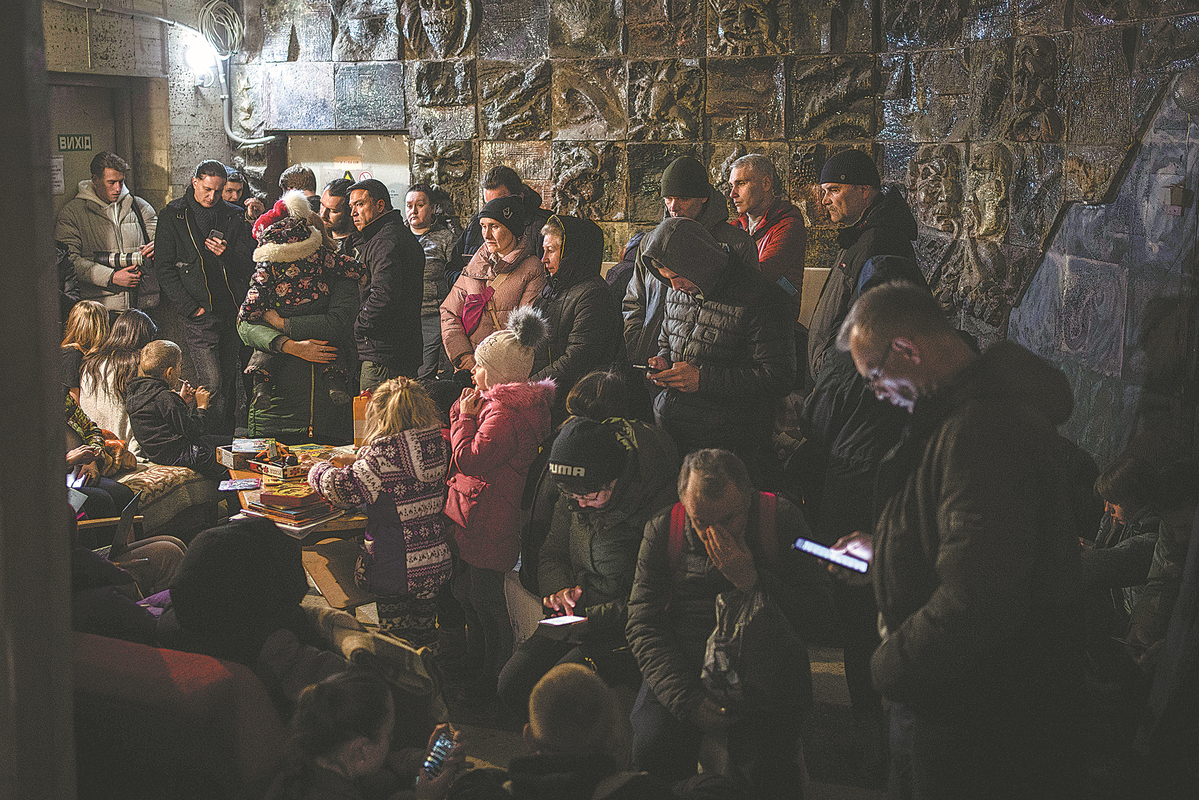
West should not supply weapons funds and mercenaries, Duma chairman says
MOSCOW-The United States and NATO must stop supplying weapons and sending mercenaries to Ukraine, a senior Russian official said on Saturday.
"Weapons and ammunition are supplied by NATO countries. Mercenaries who fill the ranks of (Ukraine's) nationalist battalions are recruited in the countries of the North Atlantic Alliance with the consent of their leadership," Vyacheslav Volodin, chairman of Russia's lower house of parliament, or the Duma, posted on Telegram.
"So when (US President Joe) Biden and his NATO colleagues call for peace, they must first start with themselves. It is their fault that the settlement of the situation in Ukraine, its demilitarization and denazification are being delayed."
If Western countries want peace, they should channel funds not to military supplies, but humanitarian assistance to the Ukrainian people, he said.
His comments come as a Ukrainian official confirmed that the country will receive more weapons from the US.
Ukraine will receive a new shipment of US weapons within days, including Javelin and Stinger missiles, Ukraine's National Security and Defense Council Secretary Oleksiy Danilov said in a televised interview on Saturday.
"The (weapons) will be on the territory of our country in the nearest future. We are talking about days."
NATO countries have delivered planeloads of weapons shipments to bolster Ukraine's military in recent days.
According to a Reuters report, the US has informally raised with Turkey the unlikely possibility of sending its Russian-made S-400 missile defense systems to Ukraine to help it fight, citing three sources familiar with the matter.
The Turkish authorities have not commented on any US suggestion or proposal relating to the transfer to Ukraine of the S-400 systems, which have been a point of longstanding contention between the two NATO allies.
Turkish foreign ministry officials were not immediately available for comment.
Australia expanded its sanctions against Russia on Sunday by banning all exports of alumina and bauxite and pledged more weapons assistance for Ukraine.
The export ban aims to impact aluminum production in Russia, which relies on Australia for 20 percent of its alumina.
'Unacceptable nature'
On Saturday Russia's President Vladimir Putin, in a phone conversation with Luxembourg's Prime Minister Xavier Bettel, referred to "the unacceptable nature of the military-biological activities of the United States in Ukraine", the Kremlin said in a statement.
Such activities pose a huge danger to both Russia and Europe as a whole, he was quoted as saying.
The two leaders discussed Russia's "military operation" in Ukraine, and Putin talked of missile attacks by Ukrainian security forces on cities in Donbass, the statement said.
Bettel said "no one stands to gain from these clashes; not Russia, not Europe and certainly not Ukraine", according to a statement on the official website of the Luxembourg government.
Bettel briefed Putin on contacts with leaders of Ukraine and other countries, and Putin outlined his assessments of Russian-Ukrainian peace talks, the statement said.
On Thursday, the Russian Foreign Ministry asked the US to provide all information on the activities of US-linked biological laboratories in Ukraine.
Amid continuing shelling, Ukraine's Deputy Prime Minister Iryna Vereshchuk said on Sunday that seven humanitarian corridors would open on Sunday to enable civilians to leave front line areas.
Ukraine has evacuated 190,000 people from such areas since the conflict began on Feb 24, Vereshchuk said on Saturday, though Ukraine and Russia blame each other for hobbling the process.
Satellite images on Friday from Maxar Technologies showed a long line of cars leaving the southeastern city of Mariupol as people tried to evacuate. Ukraine's President Volodymyr Zelensky said more than 9,000 people had been able to leave the city the previous day.
Agencies - Xinhua
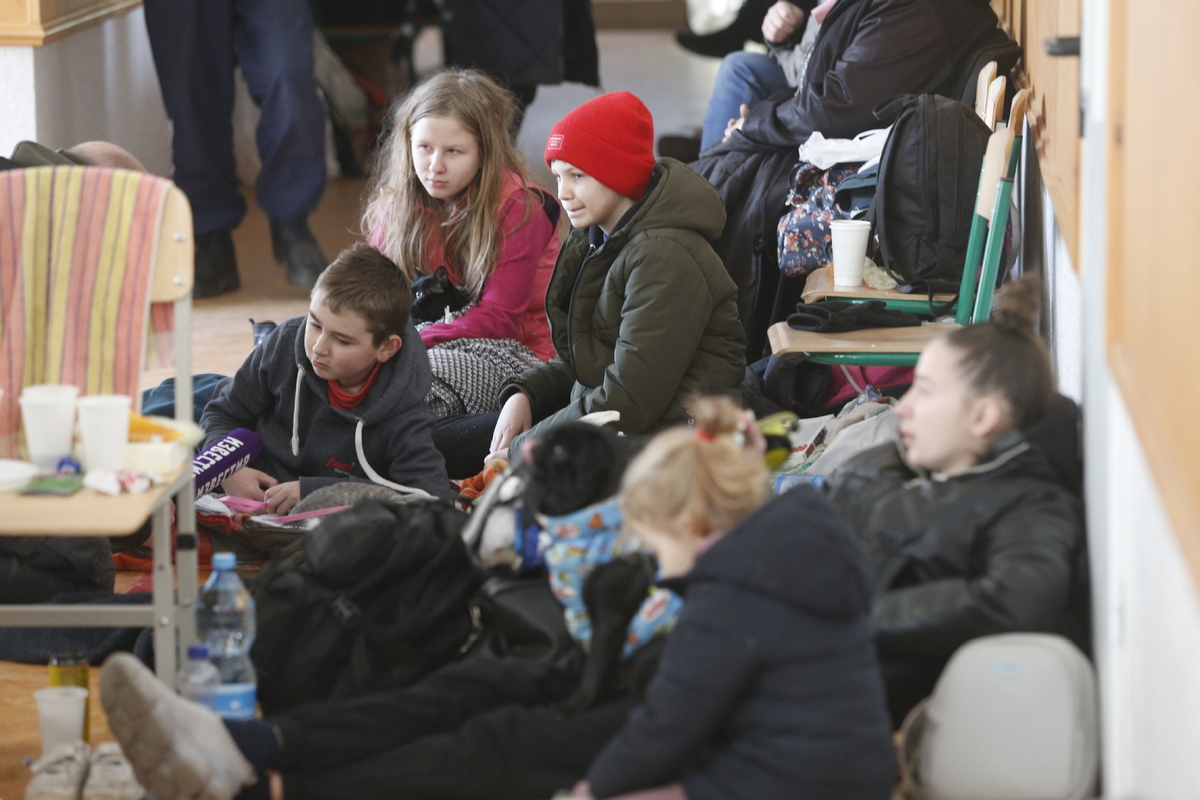
MOSCOW - Humanitarian corridors from Ukraine's Mariupol will be opened from 10 am Moscow time (0700 GMT) on Monday, Mikhail Mizintsev, head of the Russian National Defense Control Center, said Sunday.
Up to 130,000 civilians, including 184 foreigners from six countries, are "currently held hostage in the city," the Russian Defense Ministry said in a statement, citing the official.
"In order to save human lives and preserve the infrastructure of Mariupol ... Russia will open humanitarian corridors from Mariupol in the eastern and western directions upon the agreement with the Ukrainian side from 10 am Moscow time (0700 GMT) tomorrow, on March 21," Mizintsev said.
Russian forces and Donetsk's units will "declare a 'complete silence regime' and guarantee its observance from 9:30 am Moscow time (0630 GMT)," he added.
Russia is waiting for Kyiv's response to the proposed measures until 5 am local time (0200 GMT) on Monday, according to the official.
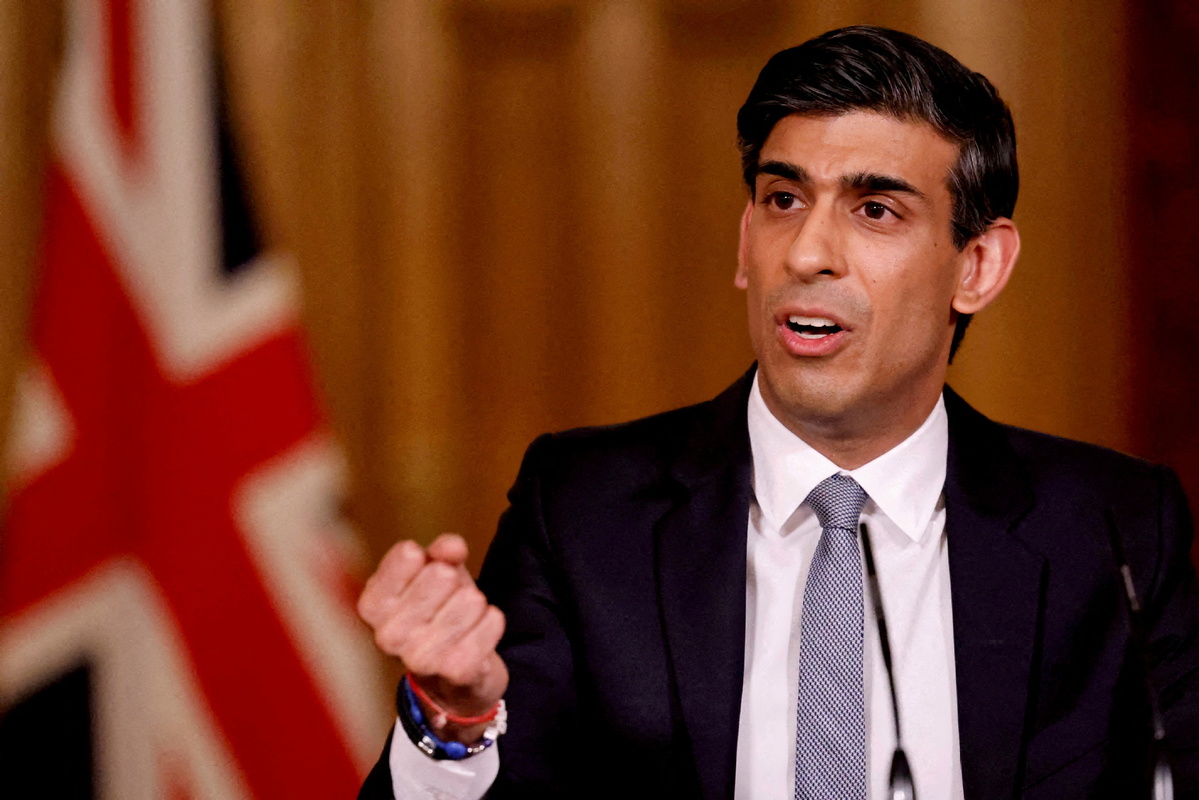
An outright ban on Russian oil and gas imports by the European Union would likely tip economies across Europe into recession, according to the United Kingdom's finance minister, Chancellor of the Exchequer Rishi Sunak.
The chancellor was said to have warned colleagues in government that an immediate embargo by the bloc would be hugely damaging to all of Europe and cost the British economy 70 billion pounds ($92 billion), reported the Financial Times.
Britain and its allies have imposed sanctions on Russia in response to the crisis in Ukraine, and the UK has announced it will cut all Russian oil imports to zero by the end of the year.
But the EU has resisted such a move and instead announced a plan to cut Russian gas imports by two-thirds within a year. It is reported to be planning a full phase-out of Russian dependency by 2030.
Last week, more than 100 members of the European Parliament signed a letter calling for an immediate EU ban on fuel imports from Russia.
The United States has already blocked imports of Russian oil and gas as part of its sanction measures against Moscow.
Russia is the world's third-biggest oil producer after the US and Saudi Arabia, according to the International Energy Agency.
Speaking to British broadcasters on Sunday, Sunak warned that the Ukraine crisis and sanctions on Russia mean the economic forecast is uncertain.
Sunak is due to deliver a statement on public finances on Wednesday, with UK inflation pushing toward 8 percent and the economy set to slow after its post-pandemic rebound.
Asked if there was a risk of recession, he would not be drawn. "What I would say to people is they should feel confident about the strength of our economy," he told Sky News. "But the outlook is uncertain ... because of what's happening in Ukraine."
European countries are hugely dependent on Russian fossil fuel imports, which account for 40 percent of the bloc's gas and 25 percent of its crude oil, according to official figures.
The Reuters news agency reported that Germany is doing all it can to secure alternatives.
"If we do not obtain more gas next winter and if deliveries from Russia were to be cut, then we would not have enough gas to heat all our houses and keep all our industry going," said Minister for Economic Affairs Robert Habeck on Saturday.
Habeck was headed to Qatar and the United Arab Emirates where he said he would discuss liquefied natural gas supplies.
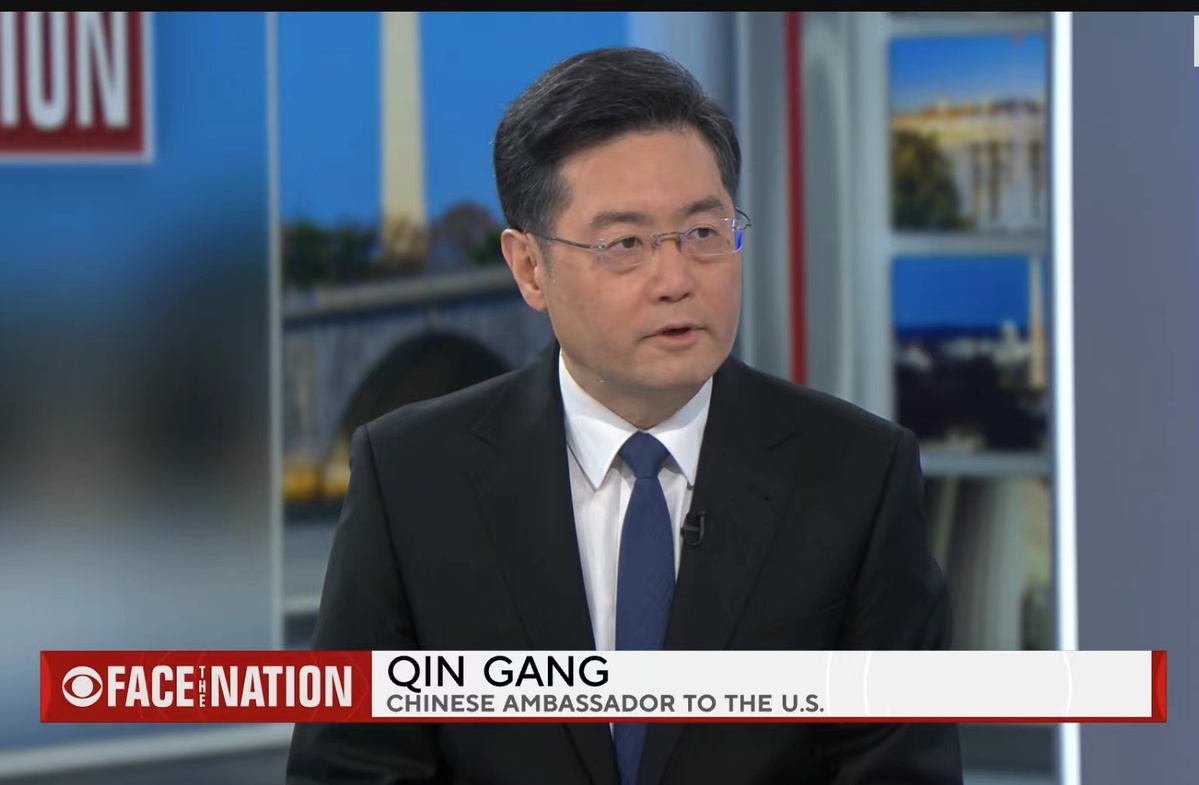
China's ambassador to the United States said Sunday that allegations that his country is providing military assistance to Russia in its conflict with Ukraine is "disinformation".
"We reject that. What China is doing is sending food, medicine, sleeping bags and the baby formula," Ambassador Qin Gang told Margaret Brennan on the CBS News show Face the Nation.
Face the Nation is a weekly American news and morning public affairs program airing Sundays on the CBS radio and television network.
Brennan repeatedly pressed Qin on the premise despite the fact that the US and NATO are providing Ukraine with billions of dollars of military and other assistance and imposing sweeping economic sanctions on Russia. Ukraine is not a member of the North Atlantic Treaty Organization.
"So President Biden asked Beijing not to provide any kind of support to Russia. Is it your intent to go ahead and give a lifeline to Vladimir Putin?" Brennan asked.
Qin replied: "On Friday, President Xi Jinping and President Biden had a video call. It was candid, deep and constructive. President Xi Jinping gave China's position very clear, that is China stands for peace, opposes war."
Xi said during the call that China is ready to provide further humanitarian assistance to Ukraine and other affected countries.
"All sides need to jointly support Russia and Ukraine in having dialogue and negotiation that will produce results and lead to peace," Xi said, adding that the US and NATO should also have dialogue with Russia to address the crux of the Ukraine crisis and ease the security concerns of both Russia and Ukraine.
"China is a peace-loving country. We hate to see the situation over Ukraine come to today's, like this, and we call for immediate cease-fire, and we are promoting peace talks, and we are sending humanitarian assistance," Qin continued.
"Will you send money and weapons to Russia, though?" Brennan persisted.
"Well, there's disinformation about China providing military assistance to Russia," Qin replied. "We reject that," he said, adding that China is not sending "weapons and ammunition to any party and we are against a war, as I said, you know, we will do everything to de-escalate the crisis".
Qin said Sino-Russia relations were "built over many years … we have a long, shared border, as long as over 4,000 kilometers (2,485 miles), and we have a lot of common interests. The trusted relations with Russia give us a unique position.
"China's trusted relations with Russia is not a liability. It's an asset in the international efforts to solve the crisis in a peaceful way," he said. "And China is part of the solution. It's not part of the problem."
"China has normal trade, economic, financial, energy cooperation with Russia," Qin said. He called the relationship "normal business between two sovereign countries … based on international order, laws, including WTO rules".
"China upholds the UN Charter purposes and principles, including respect for national sovereignty and territorial integrity of all countries, including Ukraine. On the other hand, we do see there's a complexity in the history of the Ukraine issue."
Qin added that, "China has good relations with Russia, has good relations with Ukraine, and China keeps close communications with the United States and with Europe. They enable China to reach out to all parties concerned in a crisis. So China's unique role can help the peaceful settlement of the crisis."
"What we need is good diplomacy based on vision, wisdom and the courage, and looking ahead (to) the enduring approach to the security issue in Europe."
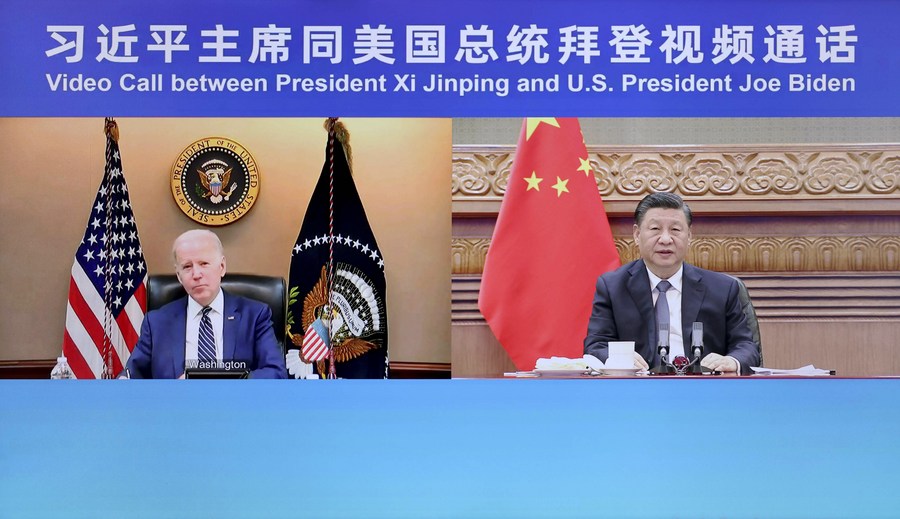
Senior Chinese diplomats followed through over the weekend on President Xi Jinping's latest points on the Ukraine situation, underscoring the acceptance and feasibility of Beijing's proposals and warning against any attempt to create a similar crisis in the Asia-Pacific region.
It is key for China and like-minded nations to remain calm and encourage an early cease-fire and oppose unilateral sanctions while drawing lessons from inducing a proxy war, analysts said.
In his virtual meeting with United States President Joe Biden on Friday evening, President Xi detailed short-term priorities for the Ukraine situation, including advancing peace talks and seeking an early cease-fire.
Xi also mapped out long-term tasks such as building step by step a balanced, effective and sustainable security architecture for the region and the world.
State Councilor and Foreign Minister Wang Yi said that what Xi proposed during the talk is the Chinese solution for resolving the Ukraine crisis. Beijing's position is objective, fair and in line with the wishes of most countries, and "time will prove that China's position is on the right side of history", Wang told reporters on Saturday in Tunxi, Anhui province.
He reiterated China's commitment to peace and its objection to war, and said Beijing makes decisions in an independent, self-reliant manner based on the right or wrong of the issues.
China will never accept any external coercion or pressure, and it opposes groundless accusations and suspicions against it, he added.

Teng Jianqun, a researcher on US studies and disarmament at the China Institute of International Studies, said: "Xi offered a detailed outline for tackling the crisis, which is a promising sign for advancing the region's stability and world peace. … He reminds the world of the need to do more to cherish hard-won peace."
Xu Yicong, a researcher at the China Foundation for International Studies and a former Chinese ambassador to Cuba, said, "Washington has been restlessly lobbying; pushing the global community to sanction Moscow to deal a heavy blow to Russia, tighten control on Europe, diminish China, intimidate smaller countries and build on its hegemony."
Beijing's cool head in handling the crisis on several fronts-such as through supporting peace talks, humanitarian aid and its citizens' evacuation from Ukraine-has helped prevent China from being fooled by other parties and makes it a trustworthy partner for collaboration, Xu said.
"China is now one of the few countries that have open lines of communication with all parties directly involved, and even the US itself has approached China for assistance. This shows how important it is to stick to a right solution," Xu added.
Vice-Foreign Minister Le Yucheng called on Saturday called for countries to draw lesson from the Ukraine crisis, urging nations not to seek absolute security of their own, or become involved in bloc politics, group confrontation and abuse of sanctions.
"The abuse of sanctions will bring catastrophic consequences for the entire world "and "small countries should not be used as pawns" to fight proxy wars, Le warned when delivering a virtual speech at the Fourth International Forum on Security and Strategy.
He called on Asia-Pacific countries to prevent a crisis similar to what happened in Ukraine from happening in the region, urging them not to undermine regional tranquility, interfere in others' internal affairs, create division and confrontation or "let others decide our future".
The US-led "Indo-Pacific Strategy" is "as dangerous as the NATO strategy of eastward expansion in Europe", Le said.
"If allowed to go on unchecked, it would bring unimaginable consequences, and ultimately push the Asia-Pacific over the edge of an abyss," he added.
Li Haidong, a professor of US studies at China Foreign Affairs University, noted that China-US ties are at a critical phase, and while Beijing opposes defining the ties as competition, Washington's China policy has been focused on this aspect.
"Such thinking of the US may eventually veer the ties toward a breakdown. What China expects is joining hands with all countries to advance world economic integration," Li said.
Still, the virtual meeting between Xi and Biden set the tone for identifying areas and issues that both sides should work on, put aside, manage or control, Li said.
"The role of leaders' diplomacy in navigating China-US ties has served as a cornerstone for keeping the relations stable in the past 50 years, and today its role is still irreplaceable," he said.

Russia claimed on Saturday that it had unleashed hypersonic missiles against an arms depot in Ukraine, the first use of the next-generation weapons in combat, after Kyiv's embattled leader pressed for "meaningful" talks to halt the "special military operation" in its fourth week.
If confirmed, the use of Russia's new Kinzhal ("dagger") hypersonic missile, which can elude most defense systems, would mark a new escalation in Russia's campaign to force Ukraine to abandon hopes of closer ties with the West.
"The Kinzhal aviation missile system with hypersonic aeroballistic missiles destroyed a large underground warehouse containing missiles and aviation ammunition in the village of Deliatyn in the Ivano-Frankivsk region (of western Ukraine)," Defense Ministry spokesman Igor Konashenkov said on Saturday.
The region of Ivano-Fran kivsk shares a 50-kilometer-long border with NATO member Romania.
The ministry also said Russian forces used the anti-ship missile system Bastion to destroy Ukrainian military facilities near the Black Sea port of Odesa.
Russian President Vladimir Putin, who unveiled the Kinzhal missile in 2018, has called it "an ideal weapon" that flies at 10 times the speed of sound.
Ukrainian Air Force spokesman Yuri Ignat told Agence France-Presse that the depot in Deliatyn, a village near the border with Romania, had indeed been hit but "we have no information of the type of missile".
Moscow's announcement came hours after Ukrainian President Volodymyr Zelensky again appealed for peace, urging Russia to accept "meaningful" talks in his latest video posted on social media.
"This is the time to meet, to talk, time for renewing territorial integrity and fairness for Ukraine," he said. "Otherwise, Russia's losses will be such that several generations will not recover."
Ukraine claimed on Saturday that a Russian general had been killed by strikes on an airfield outside Kherson, just north of Crimea, saying he was the fifth top-ranking officer killed since Feb 24.
Russia didn't confirm the information, but said its troops had broken through Ukrainian defenses to enter the strategic southern port city of Mariupol, prompting more people to join the millions fleeing their homes.
On Sunday morning, the Mariupol City Council said an art school being used as a shelter in the besieged city had been bombed by Russian forces.
About 400 people were sheltering in the building, which was destroyed in the attack, the council said.
Russia has repeatedly denied that its attacks were targeting civilians, saying they instead were targeting military facilities with "high-precision weapons".
Mikhail Mizintsev, chief of Russia's National Defense Management Center, accused Ukrainian nationalists of planning chemical attacks in several regions.
He said nationalists have placed mines in ammonia and chlorine storage facilities at the Sumykhimprom chemical plant in Sumy in order to poison the Sumy region's residents in case Russian troops enter the city.
Separately, Russia's Federal Security Service said mines that Ukrainians had deployed in the Black Sea could drift as far as the Bosporus Strait and the Mediterranean Sea.
Storms have cut cables to some of those mines, which are now floating freely in the western Black Sea, pushed along by wind and the currents, the security service warned.

KYIV - Ukrainian President Volodymyr Zelensky signed a bill extending martial law in Ukraine, the press service of Ukraine's parliament said Sunday.
The legislation extended the current martial law for 30 days starting March 26.
Kyiv imposed martial law after Russia launched a special military operation against Ukraine on Feb 24.
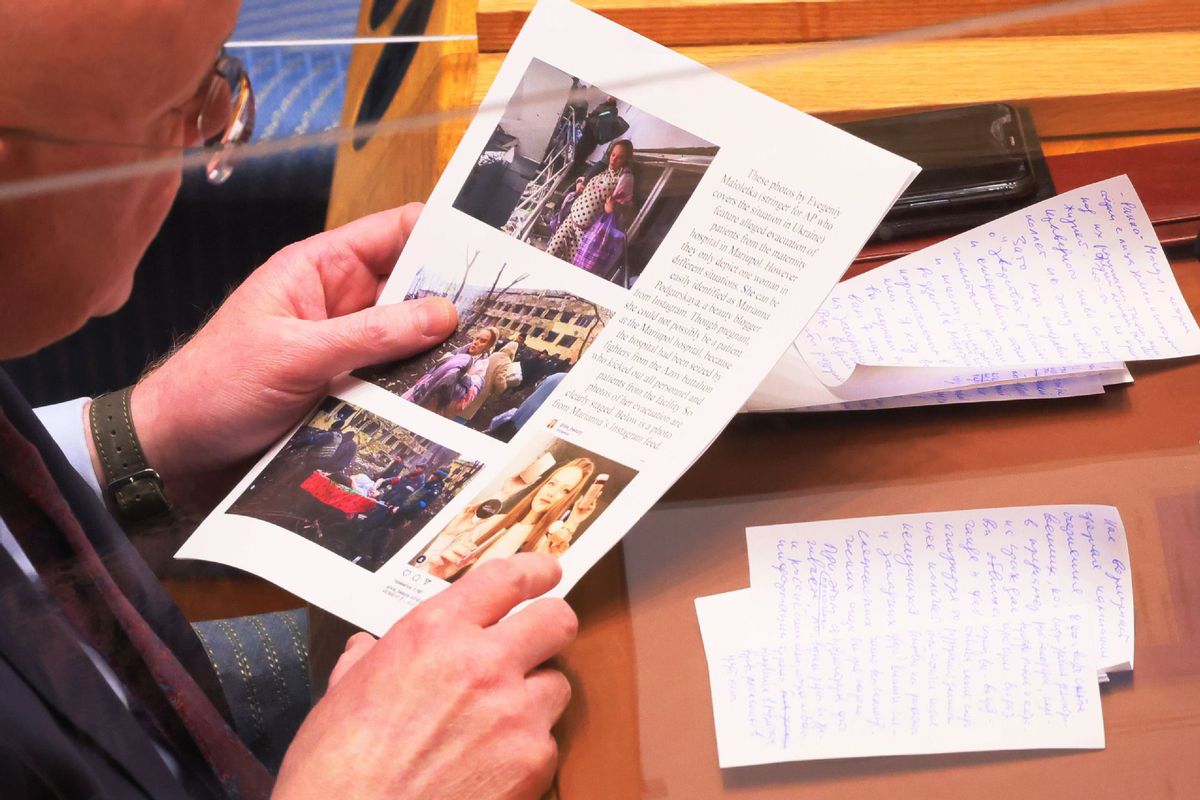
MOSCOW - Russian President Vladimir Putin stressed on Saturday "the unacceptable nature of the military-biological activities of the United States in Ukraine" in a phone conversation with Luxembourg's Prime Minister Xavier Bettel, the Kremlin said in a statement.
Such activities pose a huge danger to both Russia and the whole Europe, Putin said.
The two leaders discussed Russia's military operation in Ukraine, and Putin noted the missile attacks by the Ukrainian security forces on cities in Donbass, said the statement.
Bettel said that "we must put an end to" the conflict, and "no one stands to gain from these clashes; not Russia, not Europe and certainly not Ukraine," according to a statement on the official website of the Luxembourg government.
Bettel briefed Putin on contacts with leaders of Ukraine and other countries, and Putin outlined his assessments of the Russian-Ukrainian peace talks, the statement added.
The Russian Foreign Ministry on Thursday asked Washington to provide all information on the activities of US-linked biological laboratories in Ukraine.
Last week, US Undersecretary of State for Political Affairs Victoria Nuland testified before a Senate Foreign Relations Committee hearing on Ukraine, admitting "Ukraine has biological research facilities."
